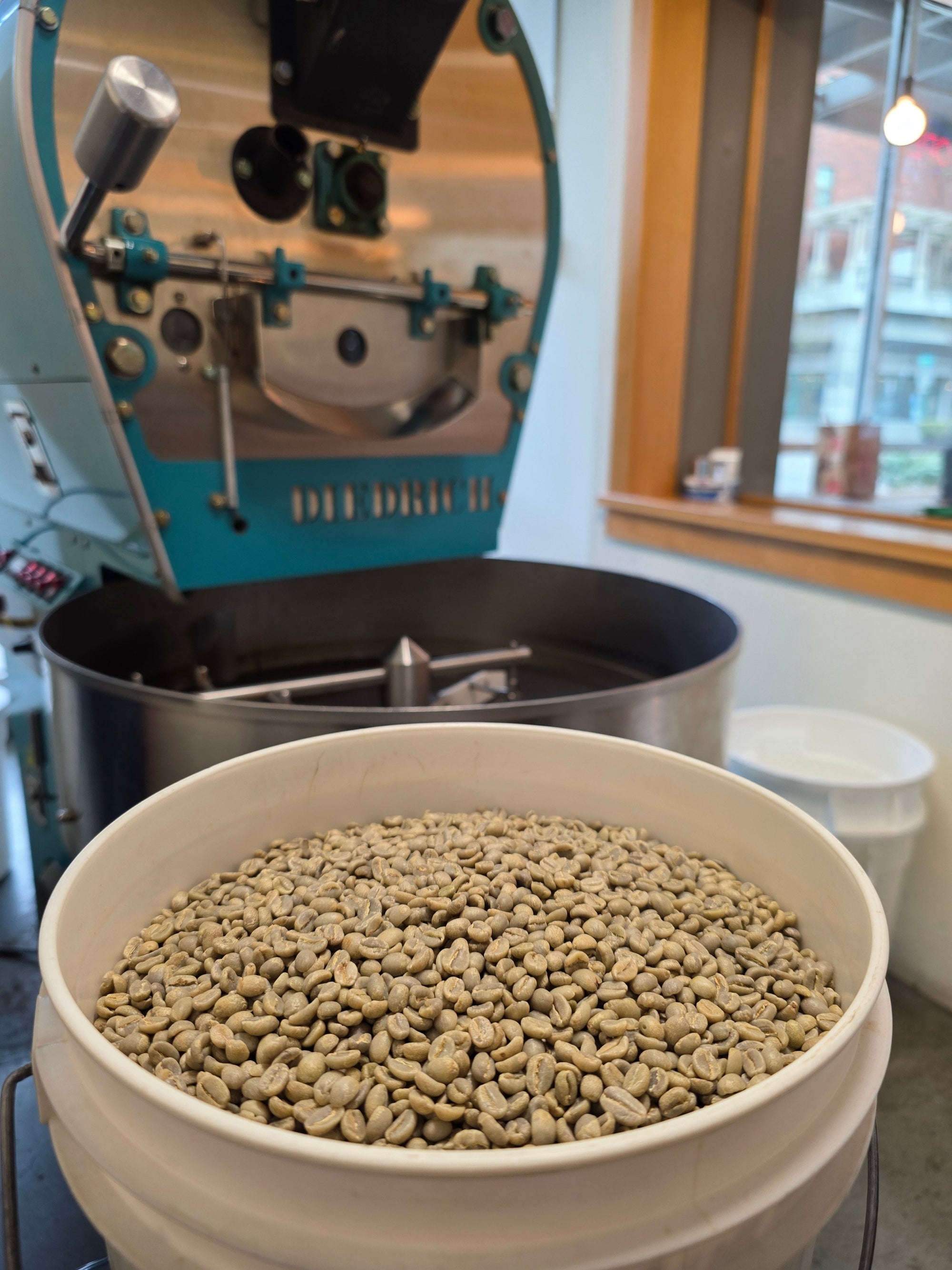

Why the Best Coffees Don't Enter the Mainstream Market
Introduction: The Hidden World of Elite Coffee
Most coffee drinkers are familiar with supermarket brands and large-scale roasters, but what they might not realize is that the best coffees in the world never make it into those channels. Instead, they operate in an entirely different marketplace—one driven by direct relationships, private auctions, and meticulous selection. If your coffee comes from a mainstream supplier, it’s almost certainly a compromise. This article will explore why the very best coffees bypass the commodities market and how direct sourcing ensures superior quality.
1. How Coffee Moves Through the Market: Commodity vs. Specialty
Coffee is generally divided into two main markets: the commodity market (C-market) and the specialty coffee market.
-
Commodity Coffee: This is coffee traded on global exchanges, where pricing is determined primarily by supply and demand rather than quality. Farmers producing for this market receive standard rates, regardless of whether their coffee is outstanding or mediocre.
-
Specialty Coffee: Defined by the Specialty Coffee Association (SCA) as coffee scoring 80 points or higher on a 100-point scale, this category rewards farmers for excellence. Instead of being bought in bulk for mass distribution, specialty coffee is selectively sourced by roasters who prioritize direct relationships, quality and freshness.
2. Why the Best Coffees Stay Outside the Commodity System
Exceptional coffees rarely enter the mainstream market because they fetch significantly higher prices in exclusive channels, and they are more limited in supply. The reasons include:
-
Private Auctions & Direct Sales: The highest-rated coffees are often sold through auctions, where top roasters compete for limited micro-lots. Auctions like Cup of Excellence specialize in prized coffees that are highly limited.
-
Limited Yields & Exclusive Micro-Lots: High-scoring coffees tend to come from small farms or single estates, producing only a few bags per year—too little to supply mass-market roasters. Innovative processing methods like co-ferments and carbonic maceration do not operate at scale and fundamentally artisanal practices.
-
Pricing Freedom: While commodity coffee is subject to volatile market pricing, specialty farmers can negotiate premium prices, incentivizing quality over quantity.
3. The Role of Direct Trade & Relationships in Sourcing Better Coffee
Instead of relying on the commodity market, top-tier specialty coffee buyers build direct relationships with farmers, ensuring:
-
Higher Prices for Producers: Direct trade allows farmers to earn more than C-market rates, encouraging them to invest in better processing and sustainability.
-
Transparency & Traceability: Buyers know exactly where their coffee comes from, ensuring ethical sourcing practices.
-
Innovation in Coffee Production: Farmers who sell directly to specialty roasters are more likely to experiment with fermentation techniques, rare varietals, and meticulous drying methods that enhance flavor complexity.
4. Why Big Coffee Companies Can't Access (or Won’t Pay for) Elite Coffees
Mass-market coffee brands often rely on blended, standardized coffee to maintain consistency, making it impractical to use rare micro-lots.
-
Scalability Issues: High-end coffees are produced in small quantities, making them unsuitable for large-scale distribution.
-
Cost Constraints: Premium coffee can cost significantly more than commodity-grade beans, making it unappealing for companies focused on low-cost, high-margin products.
-
Blending & Dilution: Some mainstream brands buy a small amount of high-quality coffee but blend it with lower-grade beans to stretch supply and maintain pricing.
5. How Supermarket Coffee Reflects a Compromise in Quality
Even when specialty coffee makes it into grocery stores, it’s often past peak freshness or over-roasted for shelf stability.
-
Long Supply Chains: Supermarket coffee can take months to reach shelves, losing vibrant flavors in the process. Supermarket coffees will almost always be stale.
-
Pre-Ground vs. Whole Bean: Many mass-market brands sell pre-ground coffee, accelerating oxidation and staleness.
-
Storage & Roasting Practices: To accommodate distribution needs, large roasters often use darker roasts that mask defects but sacrifice nuanced flavors.
6. Real-World Examples: Where the World’s Best Coffees Actually Go
To illustrate this point, consider the fate of the highest-scoring coffees:
-
Exclusive Direct-Sourced Lots: The best coffees are often snapped up before they even reach an auction or wholesale market. Through relationships built over years, specialty roasters and curators secure these beans before the broader market is even aware of them.
-
Cup of Excellence Winners: These coffees are quickly acquired by boutique roasters who prioritize quality over volume.
-
Experimental Fermentation Micro-Lots: Producers in Colombia, Ethiopia, and Costa Rica are pioneering unique fermentation techniques, selling their best lots through direct trade rather than wholesale channels.
7. The Science of Coffee Quality
Not all coffee is created equal. Exceptional coffee isn’t just about the variety of beans—it’s about the conditions in which they grow and how they are processed. Key factors include:
-
Altitude – Higher elevations generally produce denser, more flavorful coffee beans.
-
Soil Composition – Volcanic soils, rich in minerals, contribute to complex flavors. Terroir is as important in coffee as it is in the world of wine.
-
Climate & Microclimates – Temperature fluctuations affect bean development, resulting in richer profiles.
-
Processing Methods – Washed, natural, honey, and anaerobic fermentation techniques dramatically alter taste.
Podium Coffee Club partners with roasters who understand these nuances and source coffee from farms that meticulously optimize these factors.
8. The Economics of Coffee: Why Exceptional Beans Are a Limited Resource
The best coffee never reaches supermarket shelves because it is inherently scarce. Farms producing rare micro-lots—unique batches of beans with extraordinary characteristics—don’t rely on bulk commodity sales. Instead, they cultivate direct relationships with roasters who are willing to pay premiums for their exclusivity.
-
Scarcity & Demand – A farm might produce only a few hundred pounds of an award-winning coffee, meaning only a select group of buyers will ever get access.
-
Premium Pricing & Incentives – Farmers who sell to specialty markets earn significantly more per pound than they would through commodity sales, encouraging them to continue investing in quality.
-
Podium Coffee Club’s Advantage – Our network allows us to access these hidden gems before they ever reach the broader market. These coffees are never available at mainstream roasters or supermarkets—they’re snapped up long before they get the chance.
9. The Role of Coffee Competitions & Their Influence on Sourcing
Competitions such as the Cup of Excellence and Best of Panama shine a spotlight on the world’s best coffees. Winning farmers often see their beans auctioned off at premium prices, sometimes fetching hundreds of dollars per pound. But here’s the catch—many of these elite coffees don’t even make it to auction because specialty buyers secure them beforehand.
Podium Coffee Club’s roaster partners have deep ties in this space, allowing them to identify and purchase standout coffees before they’re widely recognized. This means our members get access to competition-worthy beans without having to bid at auction prices.
10. The Hidden Costs of Mass-Market Coffee
Most supermarket coffee is a compromise. Large-scale roasters prioritize volume over quality, cutting corners at multiple stages:
-
Harvesting Methods – Commodity-grade coffee is often strip-picked, meaning unripe, ripe, and overripe cherries are harvested together, leading to inconsistent flavors. In contrast, specialty coffee is selectively handpicked for peak ripeness.
-
Storage & Freshness – Mass-market coffee can sit in warehouses for months before reaching store shelves, leading to stale, oxidized flavors. Specialty coffee is roasted to order, ensuring optimal freshness.
-
Roasting Approach – Large brands roast coffee dark to mask defects and create uniformity, sacrificing the unique characteristics that make coffee special. Podium Coffee Club works with roasters who highlight the natural flavors of each bean.
11. Why Direct Relationships Matter
Rather than relying on brokers or middlemen, we work directly with award-winning roasters who maintain close relationships with coffee producers. This means:
-
Better compensation for farmers – They receive higher prices, incentivizing continued quality improvements.
-
Exclusive access to rare lots – We get first pick of outstanding coffees before they reach the commodity market.
-
Ethical sourcing & sustainability – Direct trade ensures transparency, benefiting both farmers and consumers.
Conclusion: Why Podium Coffee Club Brings You the Best
If you want access to truly exceptional coffee, you can’t find it in a supermarket or from a mass-market roaster. Podium Coffee Club specializes in sourcing from the top 1% of roasters, who secure exclusive lots before they ever reach the broader market. Our curation expertise and relationships allow us to bring you superior coffee at an accessible price—without the premiums of exclusive auctions.
By subscribing, you bypass the compromises of the mainstream coffee industry and experience the pinnacle of what coffee can be—fresh, vibrant, and unlike anything found on grocery store shelves.
Want to Taste the Difference? Join Podium Coffee Club Today.
Explore the world of elite coffee and taste what makes direct relationships and meticulous sourcing so special. Subscribe now and elevate your coffee experience.




